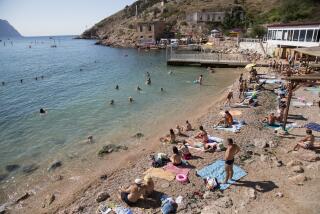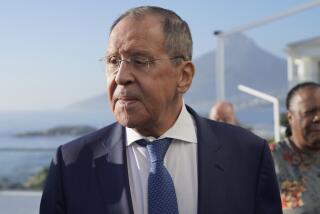Cold War remnants evident in Russiaâs influence in Cyprus
Reporting from Limassol, Cyprus â The hottest video rental in this beachside resort town isnât some action-packed Hollywood blockbuster, but âBrigada,â a Russian miniseries about a bunch of army buddies who form an organized crime syndicate before theyâre rubbed out by a group of younger, more unscrupulous rivals.
The Russian influence here is also visible in shop signs using the Cyrillic alphabet and Russian flags hanging outside stores just down the street from Starbucks.
âWeâve had good relations with the Russians for a long time,â said Nikos Andreo, a 57-year-old wine grower in Limassol. âAnd theyâre helping the Cypriot problems, as opposed to the U.S., which is not helping.â
The Cold War between the West and the Communist bloc ended 20 years ago, though the recent arrests and subsequent swap of 10 alleged Russian spies for four alleged U.S. spies demonstrated the continuing geopolitical rivalry.
Since a 1974 war, the northern third of Cyprus has been a Turkish enclave recognized by no country other than Turkey. The Greek Cypriot majority here feel that the U.S. implicitly backs NATO ally Turkey in the dispute, giving Russia an economic and diplomatic opening.
In Cyprus, where an alleged Russian spy wanted by the U.S. skipped bail and vanished, the most concrete illustration of the continued squaring-off can be seen in Nicosia, where massive new Russian and American Embassy compounds lie practically adjacent.
The mostly Greek Cypriot locals here rang church bells when President Obama was elected, hopeful that he would change the countryâs policy on Cyprus, which supports reunification of the island but does not take a stance against Turkey. But Cypriots in 2008 elected as president the leader of the local Communist Party, giving Moscow-educated Demetris Christofias 53% of the vote.
Many independent observers and analysts questioned a Cypriot judgeâs decision to release accused Russian spy Robert Christopher Metsos on $34,000 bail to await an extradition hearing requested by the United States. Metsos, traveling under a Canadian passport, disappeared from his hotel last month.
Though Cyprus is far from Russiaâs shores, this rocky and storied Mediterranean island illustrates the persistence of Russian economic and political ambitions.
Even though they are unable to compete with China or Western firms selling sophisticated electronics or machinery, state-owned Russian manufacturers have sold Cyprus tens of millions of dollars in military equipment in recent years, including sophisticated tanks and antiaircraft missiles. The alleged spies recently exchanged on the tarmac of a Vienna airport had been partially tasked with conducting industrial espionage, according to U.S. officials.
âItâs clear that a lot of the competition, where there is competition, is in the economic sphere,â said Paul Saunders, a Russia specialist at the Nixon Center in Washington.
Emissaries of brightly colored Western corporate capitalism are here in droves, but so are the legions of Russiaâs particular style of murky slicked-back commerce, much of it tied to alleged money-laundering schemes, according to lawyers and employees of Russian companies here who spoke on condition of anonymity for fear of upsetting their bosses.
âRussian capitalism is a much more brutal and streamlined process than in the West,â said Dex Torricke-Barton, a Russia expert working as a consultant for the United Nations. âIf you win in Russian capitalism, you take everything. If you lose, you end up in prison.â
Five direct flights a day connect this island nation of about 1 million people to Moscow. Corporate lawyers say anyone can set up shop here for $5,000, creating any kind of business as a possible tool for money-laundering. At some point in the 1990s, Cyprus became a principal conduit for Russian oligarchs to launder ill-gotten gains they later poured back into Moscow real estate or other ventures in their homeland, experts say.
âMany well-connected oligarchs as well as corrupt officials have bank accounts in Cyprus,â said Alexander Gabuev, a writer and analyst for Kommersant, a Moscow business daily. âIn the 1990s, it was a very popular [among] holidaying criminals.â
Since joining the European Union in 2004, the Republic of Cyprus has tried to do away with its reputation as a haven for Russian criminals.
But in Limassol, a city of 180,000, the Russian presence remains tangible. Middle-aged Russian businessmen, their sunburned bellies hanging over Speedo swimming briefs, walk hand in hand with young, bleached-blond beauties wearing form-fitting designer tops and holding Louis Vuitton handbags. Real estate companies advertise seaside townhouses selling for millions of dollars in the Russian Cyrillic alphabet, though some say they no longer need to.
âTwenty years ago, the Russian visitors were quite different,â said Pantelis Kolatsis, a realtor in Limassol. âThe majority couldnât even speak English. Now theyâre educated. The majority now speak English.â
More to Read
Sign up for Essential California
The most important California stories and recommendations in your inbox every morning.
You may occasionally receive promotional content from the Los Angeles Times.










